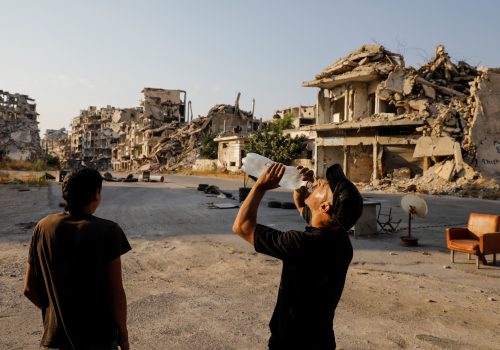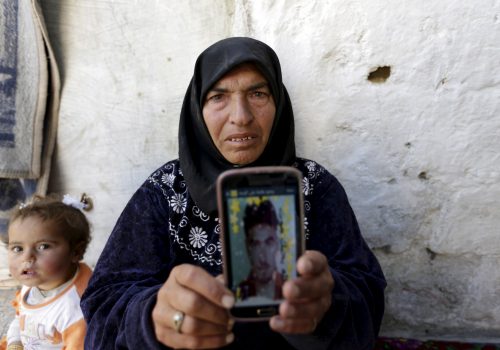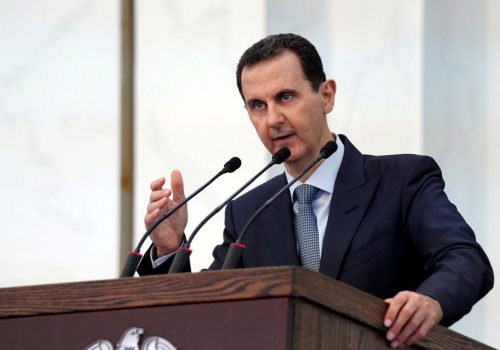February 10, 2022
A perpetrator of Syrian crimes against humanity went free in France. Here’s why it shouldn’t happen again
In mid-November 2021, legal proceedings against Abdulhamid C. were about to conclude. The 32-year-old Syrian national and former member of state security in the Bashar al-Assad regime in Syria had been detained on the outskirts of France’s capital in February 2019 and indicted for crimes against humanity by the special prosecutor in Paris. An investigation conducted with the tribunal team within the Caesar framework—a series of brutal photos of the dead bodies of prisoners taken by “Caesar,” a Syrian military photographer—had uncovered evidence of C’s involvement in the arrest of protesters between 2011 and 2013 in the capital Damascus.
But the process came to an abrupt halt. The Court of Cassation—France’s highest jurisdiction for civil and criminal matters—ruled on November 24, 2021 that the proceedings launched against C. were illegal. The decision threw all proceedings against Syrian and other nationals suspected of crimes against humanity in France into doubt, undermining the country’s credibility in the fight against impunity. The blow was all the heavier in contrast to the weighty sentence Germany’s regional court in Koblenz was about to hand down to Colonel Anwar Raslan, the former officer of the intelligence services of the Assad regime (who had participated in the torture and murder of prisoners as the head of the investigation unit at a notorious Damascus prison), on January 13.
Other factors made the Court of Cassation’s ruling particularly untimely. Having taken up the presidency of the European Union (EU) Council, a major executive intergovernmental body of the EU, it would have been fitting for France to set an example for its partners. Moreover, the fleeing of the Syrian dictator’s uncle, Rifaat al-Assad, from France in October 2021—despite a jail sentence handed down by a French tribunal—recalled the country’s longstanding complacency towards former dignitaries of the Assad regime.
In recent years, French diplomacy has sought to mobilize the international community in the fight against impunity. It played an active role in ensuring the dissemination of photos documenting regime torture, known as the Caesar Files, while contributing to the formation of the United Nation’s Impartial and Independent International Mechanism, headed by a French magistrate. It supported the commission of inquiry on Syria, and not a week went by without Foreign Minister Jean-Yves Le Drian underlining his commitment to the quest for justice. In February 2020, he co-signed a text with other European ministers that vowed: “We will maintain our commitment—notably within the framework of our national jurisdictions—so that the crimes committed in Syria do not go unpunished.”
Another unintended consequence of stopping proceedings against Syrians charged with crimes against humanity was to undermine actions against impunity in relation to the use of chemical weapons. Here too, France has played a pioneering role as the head of the International Partnership against Impunity for the Use of Chemical Weapons, which brings together some forty countries.
For French authorities seeking to formulate an appropriate response, the question was why the Court of Cassation had reached its decision. France has a limited form of universal jurisdiction. A law that passed on August 9, 2010—which incorporated into French law the Rome Statute that established the International Criminal Court—allows for legal proceedings against individuals residing in France who are suspected of war crimes and crimes against humanity.
Among the requirements is so-called “double criminality,” whereby French prosecutors can only prosecute crimes when they are expressly criminalized by the state where they were committed, or if that state is a party to the Rome Statute and has, thus, criminalized the conduct by ratifying the treaty. The Court of Cassation noted that this wasn’t the case for Syria, though lower jurisdictions had interpreted it differently.
If France is to remain consistent with its international commitments, the only option for the Emmanuel Macron government is to amend the 2010 law to suppress the “double criminality” requirement. During a debate at the Foreign Affairs Commission on January 18, France’s Ministry of Europe and Foreign Affairs committed to move in this direction. A statement circulated set out in black and white: “Provided the suitable parliamentary modalities can be found, the Ministry of Europe and Foreign Affairs is resolutely in favor of suppression of the double criminality requirement for crimes against humanity. This suppression would be applicable with immediate effect.”
This position is evidently important. Nevertheless, two obstacles remain. Firstly, the Justice Ministry—not the Foreign Ministry—is responsible for criminal policy. In the months preceding the Court of Cassation’s ruling, the Justice Ministry refused amendments proposed by members of parliament seeking to amend the law. One can only hope that the halt in proceedings on November 24, 2021 will lead the Justice Department to reconsider its position. If nothing else, the Court of Cassation’s ruling has made plain the absurdity of the double criminality requirement. The question remains: how likely is it that a country that commits crimes against humanity will outlaw such crimes or take any possible prohibition of those crimes seriously?
The second obstacle is the parliamentary calendar. Due to the upcoming French presidential election in April, the current parliamentary session will close at the end of February. General elections are due to take place on June 12 and 19 and the new assembly will not hold its first session until October. An extraordinary session could be convened in June or July, but only to deal with urgent domestic affairs. It will, thus, fall upon a new government and assembly to re-examine the 2010 law—no sooner than the end of the year in all likelihood.
Therefore, it’s the responsibility of all those committed to the fight against impunity in France to keep mobilizing so that no more time is lost. It would be a great shame for France to fall behind other countries—in particular its European partners—in the effort to deliver justice to the victims of the Assad regime.
If the scope for changing the course of events in Syria is limited, it’s honorable to take a stand against the abominable crimes of the Assad regime. It would be a great pity for France to be seen as a safe haven for Assad’s accomplices. Nevertheless, today, Abdulhamid C. walks free.
On a political level, convicting those responsible or complicit in the regime’s crimes against humanity serves to erode the legitimacy of the Assad clan. At a time when many countries are moving to normalize relations with Damascus, it’s more important than ever that the regime’s true nature, which plunged Syria into the abyss, isn’t forgotten.
Ambassador Michel Duclos is a nonresident senior fellow at the Atlantic Council’s Rafik Hariri Center for the Middle East and a senior advisor to the Institut Montaigne. Follow him on Twitter: @MrjDuclos.
Further reading
Wed, Sep 2, 2020
Caesar Act: The Syrian people are sapped while Assad grows stronger
MENASource By
The Bashar al-Assad regime is unconcerned about Syrian lives and, thus, worsening economic misery is unlikely to shift its calculations.
Tue, Oct 6, 2020
I survived Assad’s torture—here’s why I’m a proud advocate of the Caesar Act
MENASource By
The Caesar Act is not the solution, but an important tool that the US and the international community must use alongside others to end the killing in my homeland.
Mon, Aug 24, 2020
The Caesar Act might alter the UAE’s normalization policy with Syria
MENASource By
Even if the US chooses to withhold more punitive measures against Emirati entities for the time being, Abu Dhabi’s posture of rapprochement with Syria may come under closer scrutiny from Washington down the road.
Image: French Prime Minister Jean Castex and French Justice Minister Eric Dupond-Moretti attending the solemn hearing at the Court of Cassation, one of the four courts of last resort in Paris, France, on January 10, 2022. Photo by Stephane LemoutonPool/ABACAPRESS.COM


